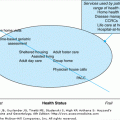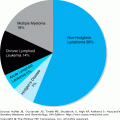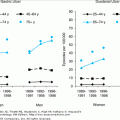Team Care: Introduction
Geriatric interdisciplinary team care has been shown to be essential to manage the complex syndromes experienced by frail older adults. Providing comprehensive care to geriatric patients with multiple illnesses, disabilities, increased social problems, and fragmented care requires skills that no one individual possesses. Older adults are, therefore, best cared for by a team of health professionals. Outcomes associated with effective geriatric interdisciplinary team care include the improvement of functional status, perceived well-being, mental status, and depression. Geriatric interdisciplinary team care has also been shown to be cost effective by reducing patient readmission rates and numbers of physician office visits. Specialized interdisciplinary teams focusing on specific diseases such as congestive heart failure, stroke, or myocardial infarction have also demonstrated improved patient outcomes. The purpose of this chapter is to outline the benefits of interdisciplinary geriatric team care. The current and projected health care workforce shortage, coupled with the aging of the population dictate that care models be as efficient and effective as possible. Managing the complex syndromes experienced by frail older adults requires skills beyond the training of one discipline and multiple clinicians to communicate with each other regularly in order to coordinate services. These needs have resulted in the growth of geriatric interdisciplinary teams.
In 1993, the Pew Health Professions Commission predicted that health professionals would need 17 competencies to practice health care in 2005. Anticipating a shift toward population-based medicine, increasing use of technology, and managed care, the competencies included an emphasis on primary care, participation in coordinated care, involvement of patients and families in decision making, and ensuring cost effectiveness. While regulators and policy makers, almost a decade later, seem less enthralled with managed care, the forces driving managed care-increasing costs, concerns about cost effectiveness, and a focus on prevention have not slowed.
The Joint Commission on Accreditation of Healthcare Organizations stated that shared decision making and an interdisciplinary health care team approach are essential to reduce medical errors and to provide improved patient safety in all health care organizations in America. The Institute of Medicine of the National Academies made a similar plea in the Quality Chasm report, strongly urging that all health professionals receive interdisciplinary team training to ensure the delivery of patient-centered care. More recently, additional reports from the Institute of Medicine of the National Academies specifically point to the need for interdisciplinary care for geriatric patients.
In 1995, The American Geriatrics Society developed a position statement on interdisciplinary care for older adults, which supports the interdisciplinary care model for the following reasons:
Interdisciplinary care meets the complex needs of older adults with multiple, interacting comorbidities.
Interdisciplinary care improves health care processes and outcomes for geriatric syndromes.
Interdisciplinary care benefits the health care system as well as caregivers of older adults.
Interdisciplinary training and education effectively prepares providers to care for older adults.
Studies of the clinical effectiveness and cost effectiveness of teams generally demonstrate that patients are helped by an initial comprehensive geriatric assessment conducted by multiple disciplines. Team management and internal performance also seem to matter. In a study of the 26 Program of All-Inclusive Care for the Elderly (PACE) sites, teams that ranked themselves as performing better had patients with better 3- and 12-month outcomes in Activities of Daily Living (ADL) performance and better urinary incontinence rates. It appears that coordination of services, ability of team members to communicate well, and agreement from the multiple providers over how to implement complex care improve patient outcomes in both the short and the long terms. While there was no difference in mortality owing to team performance, changes in patient outcome were risk adjusted. Teams require management skills, leadership, and well-honed communication skills. Coordinating care, leading group discussions, and managing conflict are the key team skills that are discussed below.
Studies focusing on patient satisfaction have demonstrated that the presence of a team champion and the involvement of the physicians on the team are positively associated with greater perceived team effectiveness. Maintaining a balance among culture values of participation, achievement, openness to innovation, and adherence to rules and accountability also appeared to be important.
Collaboration and the Importance of “Interdisciplinarity”
Collaboration implies a process of shared planning, decision making, accountability, and responsibility in the care of the patient. In collaborative practice, providers work together. They demonstrate effective communication, trust, mutual respect, and understanding of others’ skills. While skills and services may overlap, most skills and services are complementary and reinforce each other.
With advanced technology and the growth of community-based care, providers frequently provide home treatments or treatments in the nursing home that were previously delivered exclusively in the hospital setting. Monitoring older adults in these community settings requires good communication skills, because providers need to understand and correctly implement complex plans of care. It is crucial to recognize when to alert other providers of change in status. It is also important to learn what information other team members require to make decisions about treatment.
With the advent of managed care, there is an emphasis on efficiency and appropriate use of resources. Skills in coordinating care and being responsive to older adults increase in importance. Physicians, nurses, social workers, and other providers must recognize when referrals to other providers are necessary and know what outcome to expect. Understanding the skills of other health providers is increasingly important for all patients but is critical in the care of frail older adults.
Transitions from one health care setting to another are particular periods of risk for elders, and programs designed to smooth those transitions result in better patient outcomes. Patients have benefited from programs designed to improve the transition between hospital and home. A study in which nurse practitioners followed elders after hospital discharge for heart failure at home demonstrated the effectiveness of these clinicians in reducing rehospitalizations and improving the confidence and comfort of the caregiver at home.
For almost a decade, the John A. Hartford Foundation of New York City has supported an effort to incorporate team training into graduate medical, nursing, and social work education. The program, Geriatric interdisciplinary Team Training (GITT), has trained more than 1800 health care students and professionals across the country and developed training materials to encourage the development of effective geriatric teams. Two important principles were realized in the development of curriculum and programs. Effective teams require a structure and an understanding of group process, skills that can be taught and should continue to evolve during professional development. However, teams must focus on the outcome of the team process, the creation of an interdisciplinary care plan, or the management of the complex patient. While structure and process increase the efficiency of teams, assessing the team’s effectiveness must be based on the outcome of team meetings and the ability of the team to address and improve the patient’s and the family’s needs.
To be effective in managing the complex care of older adults, team knowledge and skills must emphasize multidimensional geriatric assessment, interdisciplinary team care planning, maximization of self-care and function, self-determination in the care plan, and improving quality of life. Future health professionals providing care to older individuals will be expected to apply knowledge and skill in practice. Clinical care managers will need to evaluate providers on patient satisfaction, cost effectiveness, productivity, and quality of care. Geriatric teams of the future will be expected to identify individuals at greatest risk of functional limitations and manage groups of older persons with similar problems in a cost-effective manner. In this context, the task for educators of future health professionals and practice-based managers becomes one of ensuring that providers are knowledgeable about the principles and practices of team care.
According to the American Congress on Rehabilitation Medicine, a team is capable of achieving with patients what individuals who constitute the team cannot achieve in isolation. Simply forming a team comprised of several disciplines does not, however, guarantee that the team will function well or that the outcome of the process will be the desired one. Effective teaming as an interdisciplinary group requires structure, the use of agendas, agreement upon ground rules and process, attention to issues of leadership, communication, and respect for one another’s expertise.
Principles of Successful Teamwork
To provide the important benefits of team care, team members must know their functions and how to interact to make the team effective. The essential elements of teamwork are coordination of services, shared responsibility, and communication. Effective teams must work across settings and have well-organized mechanisms to share information. Geriatric assessment is often shared among two or more providers who administer various tests and other components of the assessment. Because the focus of the team is on the older person, the team shares a common goal. Effective teaming requires rules to govern the team and team member behavior, plans to make meetings run efficiently, clarity about the skills and boundaries for the roles and responsibilities of each team member, team communication skills, and mechanisms for managing team conflict.
Team rules, both for team governance and for member behavior, are needed in the early stages of team development. Table 26-1 provides an overview of the eight principles of successful team work. Not having these rules is a primary cause of team problems later on and can slow or stop team development completely. Rules for team governance should include some or all of the following:
- Share a clear understanding by all members (and the larger organization within which it operates) about the overall purpose of the team and the goals for each meeting.
- Determine the composition of the team, including which disciplines are needed as members and the number of members (enough to get the job done; not so many that the work cannot get done). Allow the problem to define the composition of the team, not vice versa.
- Determine how often the team needs to meet and specify attendance requirements. (Is there a core team of physician, nurse, and social worker? Are other disciplines asked to participate on cases that require their expertise?)
- Identify time, place, and duration of team meetings.
- Determine a system by which cases are to be presented and by whom. Identify how care plans and action will be carried out and documented. (Is one member chosen to write down the care plan or does this responsibility rotate?)
- Identify opportunities or requirements for team building meetings and/or team training.
- Create mechanism for enforcing both governance and behavior rules through ongoing evaluation of the effectiveness of the meeting (if rules are made and not enforced, the team can quickly become ineffective and be a negative experience for everyone involved).
|
People are usually more willing to spend time and energy if there is a clear understanding of what is going to occur and why it is needed. The time spent with participants clarifying rules and getting a commitment for involvement will prevent team problems and support the development of an effective and efficient team.
While the above governance rules provide a structure for team interaction, behavior rules are also needed for each team. They can include some or all of the following:
- Ensure clear understanding by all team members of what an interdisciplinary team is and what members should bring to the group.
- Promote understanding and respect for others’ expertise.
- Recognize the implications of idioms by the professionals involved. Learn how to articulate information clearly to others. (Do “client” and “patient” mean the same thing in different professional groups?) Health care goals will come from different perspectives and from different disciplines.
- Share information and expertise openly.
- Identify and follow a decision process when roles overlap. Resist setting rigid boundaries on roles. Instead, promote effective ways of sharing responsibilities and tasks.
- Define acceptable behavior (willingness to work with other professionals to develop a care plan, active participation, and respect for others’ roles).
The Well-Planned Meeting
Stay updated, free articles. Join our Telegram channel

Full access? Get Clinical Tree






